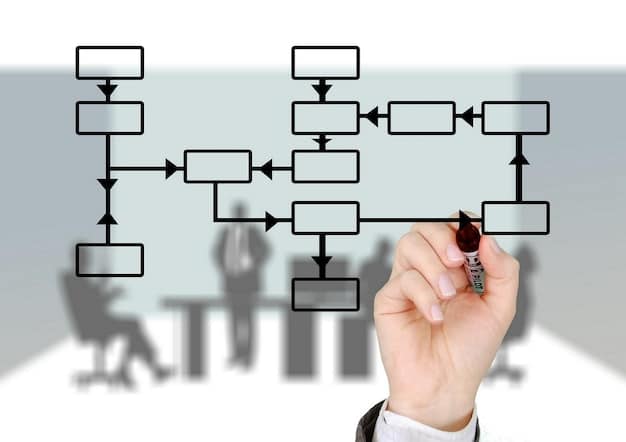Navigating the New Lobbying Disclosure Requirements: A 2025 Guide

Understanding the New Lobbying Disclosure Requirements for 2025 is crucial for lobbyists and organizations aiming to comply with evolving regulations and maintain transparency in their interactions with government officials.
Navigating the intricate world of lobbying regulations can be challenging. With the upcoming changes, understanding the New Lobbying Disclosure Requirements for 2025 is essential for lobbyists and organizations operating in the United States.
What are the Lobbying Disclosure Requirements?
Lobbying disclosure requirements mandate transparency in interactions between lobbyists and government officials. These requirements ensure that the public and policymakers are aware of who is attempting to influence legislative and executive actions.
The Lobbying Disclosure Act (LDA) of 1995, along with subsequent amendments, forms the backbone of these requirements. These laws specify who must register as a lobbyist, what activities trigger registration, and what information must be disclosed.
Key Provisions of the Lobbying Disclosure Act
The LDA establishes clear definitions of lobbying activities and who qualifies as a lobbyist. Here are some essential provisions:
- Registration Threshold: Individuals are required to register as lobbyists if they spend 20% of their time over a three-month period engaging in lobbying activities.
- Definition of Lobbying Activities: This includes direct communication with covered executive and legislative branch officials.
- Disclosure Requirements: Registered lobbyists must file quarterly reports detailing their lobbying activities, including the issues lobbied, the specific legislative or executive branch actions targeted, and the organizations contributing to their efforts.
Non-compliance with these provisions can result in civil penalties and potential legal repercussions. Therefore, understanding and adhering to these requirements is paramount for anyone engaged in lobbying activities.
In summary, lobbying disclosure requirements aim to keep lobbying transparent. They outline who must register, what activities constitute lobbying, and what information needs to be regularly reported to maintain compliance with the law.

Updates to Lobbying Disclosure for 2025
The landscape of lobbying regulations is dynamic, with periodic updates to address emerging issues and close loopholes. Several impending updates are poised to reshape the compliance landscape for lobbyists in 2025.
These updates often stem from legislative amendments, regulatory interpretations, and evolving enforcement priorities. Staying abreast of these changes is crucial for maintaining compliance and avoiding potential penalties.
Anticipated Changes in 2025
Several critical amendments and updates are expected to take effect in 2025:
- Enhanced Disclosure Requirements: Expect more granular reporting requirements, including disclosing specific communications and strategies employed during lobbying efforts.
- Stricter Enforcement: Regulatory bodies are likely to intensify enforcement, leading to more frequent audits and stricter penalties for non-compliance.
- Broader Definition of Lobbying Activities: Some interpretations may broaden the definition of lobbying activities to encompass grassroots campaigns and indirect influence efforts.
Understanding these anticipated changes will allow lobbyists and organizations to proactively adjust their practices and ensure full compliance. Monitoring regulatory announcements and seeking legal guidance can provide valuable insights into the evolving requirements.
Essentially, the updates to lobbying disclosure in 2025 signify a move towards greater transparency and accountability. Staying informed and prepared is essential for navigating these changes successfully.
Who Needs to Comply with the New Rules?
Determining who must comply with the New Lobbying Disclosure Requirements for 2025 involves assessing the nature and frequency of interactions with government officials. Not all interactions trigger compliance obligations.
Generally, individuals and organizations that engage in direct communication with covered officials to influence legislative or executive actions must comply with these rules. However, there are specific thresholds and exemptions that can affect compliance obligations.
Thresholds and Exemptions
Key factors in determining compliance obligations include:
- Time Allocation: Individuals who spend 20% or more of their time over a three-month period on lobbying activities are generally required to register.
- Covered Officials: Communications targeted towards covered executive and legislative branch officials typically trigger disclosure requirements.
- Exemptions: Certain activities, such as providing technical assistance in response to a request from a covered official, may be exempt from disclosure requirements.
Organizations should conduct a thorough assessment of their activities to determine whether they meet the thresholds for compliance. Consulting with legal counsel can provide clarity and ensure accurate interpretation of the rules.
In short, understanding who needs to comply with the latest lobbying disclosure rules hinges on carefully evaluating the nature, frequency, and target of lobbying activities, while also identifying any potential exemptions.
How to Prepare for the 2025 Changes?
Preparing for the 2025 changes in lobbying disclosure requirements involves a multi-faceted approach that includes assessing current practices, updating compliance programs, and providing training to relevant staff.
Proactive preparation can help organizations avoid compliance gaps and ensure a smooth transition to the new regulatory landscape.
Steps for Effective Preparation
Organizations should consider the following steps to prepare for the upcoming changes:
- Compliance Audits: Conduct thorough compliance audits to identify areas where current practices may fall short of the new requirements.
- Policy Updates: Update internal policies and procedures to reflect the enhanced disclosure requirements and stricter enforcement environment.
- Training Programs: Implement training programs for lobbyists and staff to ensure they understand the new rules and their obligations.
By taking these proactive steps, organizations can mitigate compliance risks and foster a culture of transparency and accountability. Regular monitoring of regulatory updates and seeking expert guidance can further enhance preparedness.
In essence, preparing for the 2025 changes requires a comprehensive approach that covers auditing, policy updates, and training to ensure full compliance and minimize potential disruptions.

The Role of Technology in Compliance
Technology plays a pivotal role in streamlining compliance with lobbying disclosure requirements. Sophisticated software solutions can automate data collection, reporting, and monitoring processes, making compliance more efficient and accurate.
Leveraging technology can also help organizations identify potential compliance gaps and ensure timely submission of required reports.
Benefits of Technology
Key technological tools and their benefits include:
- Lobbying Compliance Software: Automates data collection, tracks communication with covered officials, and generates reports.
- Data Analytics: Identifies patterns and trends in lobbying activities to ensure compliance with disclosure requirements.
- Cloud-Based Solutions: Provide secure and accessible platforms for managing and sharing compliance-related information.
By integrating technology into their compliance programs, organizations can enhance efficiency, reduce errors, and stay ahead of regulatory changes. Regular updates and maintenance of these systems are essential to maintain their effectiveness.
Ultimately, technology serves as a valuable asset in simplifying and optimizing compliance with complex lobbying disclosure requirements, contributing to greater transparency and accountability.
Consequences of Non-Compliance
Failure to comply with lobbying disclosure requirements can result in significant consequences, including civil penalties, reputational damage, and potential legal repercussions. Regulatory bodies take non-compliance seriously, and enforcement actions are becoming increasingly stringent.
The penalties for non-compliance can vary depending on the severity and duration of the violation. However, organizations should be aware of the potential risks and take proactive steps to ensure full adherence to the rules.
Potential Penalties
Common penalties for non-compliance include:
- Civil Fines: Regulatory bodies can impose substantial civil fines for failing to register as a lobbyist or for submitting incomplete or inaccurate reports.
- Reputational Damage: Non-compliance can tarnish an organization’s reputation, leading to loss of credibility and public trust.
- Legal Repercussions: In severe cases, non-compliance can result in legal actions, including investigations and potential criminal charges.
Avoiding these consequences requires a strong commitment to compliance, diligent monitoring of lobbying activities, and timely remediation of any identified shortcomings. Seeking legal counsel can provide guidance on mitigating compliance risks and addressing potential violations.
Basically, the consequences of non-compliance with lobbying disclosure requirements are serious, ranging from financial penalties and reputational harm to potential legal actions, underscoring the importance of robust compliance programs.
| Key Point | Brief Description |
|---|---|
| 📝 Registration Threshold | 20% of time on lobbying triggers registration. |
| 🔄 2025 Updates | Expect enhanced disclosure and stricter enforcement. |
| 🛠️ Compliance Prep | Audit practices, update policies, train staff. |
| ⚖️ Non-Compliance | Civil fines, reputational damage, legal action. |
Frequently Asked Questions (FAQ)
▼
Lobbying activity includes direct communication with covered executive and legislative branch officials to influence legislation or government policy. This involves specific efforts to promote, support, influence, modify, oppose, or delay any legislation or government action.
▼
Registered lobbyists are required to file disclosure reports on a quarterly basis. These reports must include details of their lobbying activities, including the issues lobbied, the specific officials contacted, and the expenses incurred.
▼
Penalties for non-compliance with lobbying disclosure requirements can include civil fines, reputational damage, and in some cases, legal repercussions. The exact penalty depends on the nature and severity of the violation.
▼
Yes, there are certain exemptions to the lobbying disclosure requirements. For example, individuals who provide technical assistance in response to a request from a covered official may be exempt. However, these exemptions are limited and specific.
▼
Organizations can ensure compliance by conducting regular audits of their lobbying activities, updating internal policies to reflect the new rules, providing training to relevant staff, and seeking legal counsel to interpret and apply the requirements accurately.
Conclusion
In conclusion, understanding the New Lobbying Disclosure Requirements for 2025 is paramount for ensuring transparency and accountability in lobbying activities. By staying informed, preparing proactively, and leveraging technology, individuals and organizations can navigate the evolving regulatory landscape effectively. A commitment to compliance not only mitigates risk but also fosters trust and credibility with policymakers and the public.





